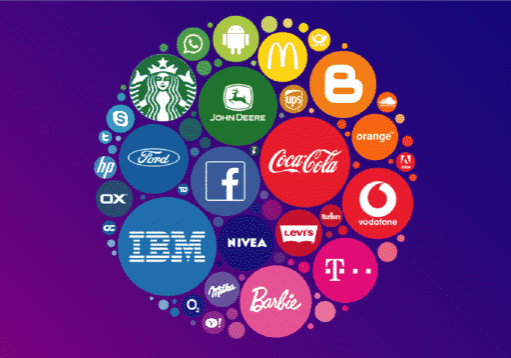Building a strong brand is a critical component of any successful business. A well-crafted brand strategy not only helps businesses establish recognition and build trust with their customers, but also supports advertising efforts and inspires employees. Furthermore, strong branding can increase a business’s financial value and generate new business opportunities through word-of-mouth referrals.
As the founder of Amazon, Jeff Bezos, once said, “Your brand is what people say about you when you’re not in the room.” In other words, your brand is not just about your logo or tagline, but the overall impression that your business leaves on your customers and the marketplace. In this article, we’ll explore six key reasons why branding is crucial for businesses of all sizes and industries.
- Branding gives you recognition: A strong brand helps businesses establish recognition and differentiate themselves from their competitors. By creating a distinct and memorable brand identity, businesses can stand out in a crowded marketplace and create a lasting impression on their customers.
- Branding establishes trust: Trust is a crucial element in building customer relationships. By establishing a polished and legitimate brand identity, businesses can instill confidence and trust in their customers, making them feel more comfortable purchasing products or services.
- Branding supports advertising: Advertising is an important component of a brand strategy, and a strong brand can make advertising efforts more effective. By aligning advertising efforts with the brand message and identity, businesses can increase the effectiveness of their advertising campaigns.
- Branding builds financial value: Strong branding can increase a business’s financial value by establishing a recognizable and trusted brand that commands higher prices and attracts more customers. A strong brand also guarantees future business by creating a loyal customer base.
- Branding inspires employees: A clear and compelling brand mission can inspire employees, and provide them with a sense of purpose and direction. A strong brand identity can also create a sense of pride and ownership among employees, leading to greater job satisfaction and productivity.
- Branding generates new business: A strong brand can provide word-of-mouth referrals, as satisfied customers recommend products or services to others. By creating a positive brand image and experience, businesses can generate new business opportunities and expand their customer base.
Branding is a crucial component of any successful business strategy. It not only establishes recognition and trust with customers but also supports advertising efforts, increases financial value, inspires employees, and generates new business opportunities. As marketing guru Seth Godin once said, “A brand is a set of expectations, memories, stories, and relationships that, taken together, account for a consumer’s decision to choose one product or service over another.” By crafting a strong and consistent brand identity, businesses can create a lasting and impactful impression on their customers and establish themselves as leaders in their industry.
Written with the help of AI.

What is the Difference Between Serif and Sans-Serif Typefaces?
You may have heard the terms serif and sans-serif before, but do you know what those terms actually mean? In typography, a serif is a small line, stroke, or other decorative flair regularly attached to the end of a larger stroke in a letter or symbol within a particular font or family of fonts. “Sans”…

Why Colors Matter
Choosing the right colors for your brand is a crucial step in building a strong and effective visual identity. While color preference is subjective, certain colors are associated with specific traits or emotions that can influence how your brand is perceived by your target audiences. Understanding color psychology and its impact on branding can help…

5 Ways a Well-Built Brand Makes Your Company Money
We all know standing out in a crowded market is essential for success. One way to do that is by creating and maintaining a well-built brand. After all, your brand is more than just a logo and a tagline, it’s the image and perception that customers have of your business. A strong brand sets you…

Offset Lithography Printing
Offset Lithography is a printing technique that uses printing plates to transfer the intended image to the intended medium, usually paper. Sometimes this technique is simply called offset printing, or litho. The printing plates are often made of aluminum, but can also be plastic, rubber, paper, or even other materials. The term offset refers to…

Do You Need a Social Media Presence?
The answer is a definitive, yes. Maintaining a consistent social media presence helps establish your brand, enforces brand cohesiveness, helps strengthen connections with existing clients, and builds trust with potential clients. An effective social media strategy requires strategic planning and a committed effort, but has many benefits for your business. Your business’s social media content…

The Difference Between Graphic Art and Graphic Design
Graphic Art – the fine and applied art of representation, decoration, and writing or printing on flat surfaces together with the techniques and crafts associated with them. Essentially, a graphic artist may create art for the sake of art. They may want to convey a certain idea or story, or they may not. Graphic artists…

What is Branding?
Now, we all know that building a strong brand is no laughing matter, but that doesn’t mean we can’t have a little fun along the way. After all, who said branding has to be boring? So, let’s start by defining what a brand really is. Think of it as your business’s personality, it’s what sets…

Why It’s Important To Have A Brand Promise
In today’s fast-paced and ever-changing business landscape, it’s more important than ever for companies to establish a clear and compelling brand promise. A strong brand promise not only helps companies differentiate themselves from their competitors, but also sets expectations for customers and helps build trust and loyalty. According to Seth Godin, a marketing expert and…

